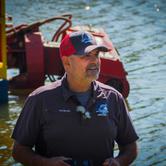Pond Dredging 101
What is Pond Dredging?
Have you ever wondered what a dredge does and why businesses hire a company like American Underwater Services to dredge their ponds or waterways? We've created this informational post about all things dredging. It will explain why dredging your ponds is essential and provides various benefits.
What is Dredging?
Dredging removes accumulated sediment from the bottom and sides of a pond. Imagine a dredge as a boat with a giant vacuum cleaner attached. Once out on the water, the dredge will lower its equipment into the water, where it will suck up and pump out unwanted sediment and debris. If this sediment accumulates, it will eventually fill in and clog the body of water, turning it into a muddy, mucky swamp.
How Do Ponds Fill up with Sediment?
Artificial bodies of water, such as golf courses and HOA ponds, are continually trying to reclaim the land that is now underwater. Various biological processes can contribute to and even speed up land reclamation. The wind blows leaves, grass, and other organic debris onto the water surface, where they sink to the deepest part of the pond. This area is known as a dead zone. Beneficial bacteria that would normally break down the organic debris cannot live in this low-oxygen part of the water. As such, sediment starts to accumulate over time. In turn, it releases enormous quantities of nutrients, which feed nuisance algae or weed growth. As time passes, sediment accumulates, eventually turning the entire pond into a smelly swamp. Dredging avoids this by removing the nutrient-rich sediment that can lead to algae outbreaks and decreased water depths. After a pond has been dredged, the ecosystem's natural balance is soon restored.
How Does Dredging Keep a Pond Healthy?
If your pond is located in an area prone to flooding, dredging can help prevent this by removing excess sediment. This can help protect against a catastrophic loss of plant and aquatic life in the event of a flood or heavy rain. Dredging can also help increase the size of the pond. Removing the mud, weeds, and trash has allowed the pond to support more aquatic wildlife. This holds true for ponds that double as fishing holes (such as an HOA pond). Removing sediment will allow for a healthier ecosystem, which in turn will support the well-being of the fish and aquatic life. Property values will also increase. Nobody likes a smelly, algae-ridden pond, and the curb appeal of a house with an ugly pond in the backyard isn't very good. By dredging your HOA pond, you'll find that local wildlife, such as birds and fauna, will return to the area and make it more beautiful.
What Are Some Other Dredging Benefits?
The muck, mud, and sediment removed by a dredge contain vast amounts of nutrients. Instead of taking it to the local landfill, many people (and HOA communities) use it as organic fertilizer. The material can be added to flower beds or in areas where the grass is having a hard time growing. Dredging can also remove various trash from the waterways. This trash is usually in the form of non-biodegradable plastics, which are unsightly and harmful to the environment. As time passes, the plastics will break down into microbeads, which fish and birds can ingest. Dredging can also help mitigate offensive smells if your pond suffers from foul odors. It can also help eliminate nuisance algae and weed outbreaks that can clog a waterway and make it look unsightly.
Nationwide Pond Dredging Services
At American Underwater Services, we're the foremost experts on dredging HOA and golf course ponds. If you're tired of adding gallons of harmful chemicals to your ponds to fight algae or nuisance weed outbreaks, call us at (817)377-8512. Our expert dredgers will work with you to develop a comprehensive game plan that will clean up your ponds and restore the natural ecosystem balance.




